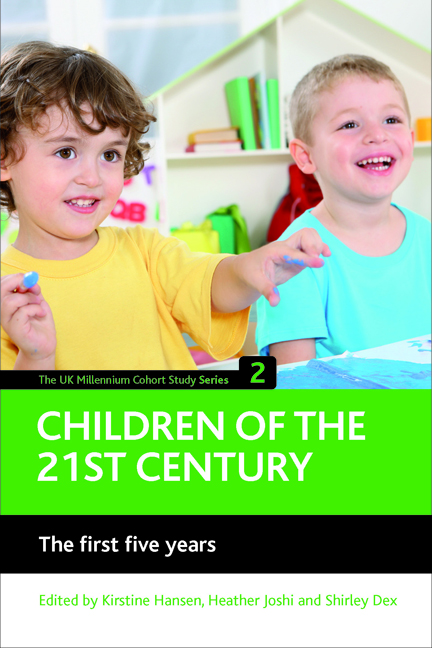Book contents
- Frontmatter
- Contents
- Acknowledgements
- List of contributors
- Glossary
- one Introduction
- two Child poverty in the first five years of life
- three Ethnicity, community and social capital
- four Parental relationships and parenting
- five Partnership trajectories, parent and child well-being
- six Employment trajectories and ethnic diversity
- seven Neighbourhoods and residential mobility
- eight Childcare in the pre-school years
- nine Intergenerational inequality in Early Years assessments
- ten Ethnic inequalities in child outcomes
- eleven School choice
- twelve Teacher assessments in the first year of school
- thirteen Childhood overweight and obesity
- fourteen Resilience in children's development
- fifteen Parental and child health
- sixteen Conclusions
- References
one - Introduction
Published online by Cambridge University Press: 01 September 2022
- Frontmatter
- Contents
- Acknowledgements
- List of contributors
- Glossary
- one Introduction
- two Child poverty in the first five years of life
- three Ethnicity, community and social capital
- four Parental relationships and parenting
- five Partnership trajectories, parent and child well-being
- six Employment trajectories and ethnic diversity
- seven Neighbourhoods and residential mobility
- eight Childcare in the pre-school years
- nine Intergenerational inequality in Early Years assessments
- ten Ethnic inequalities in child outcomes
- eleven School choice
- twelve Teacher assessments in the first year of school
- thirteen Childhood overweight and obesity
- fourteen Resilience in children's development
- fifteen Parental and child health
- sixteen Conclusions
- References
Summary
Introduction
This book takes up the story of the 19,000 children recruited into the UK Millennium Cohort Study (MCS) at the beginning of the new century, following their progress from birth to primary school. The origins and objectives of the study, along with the results of its first survey, were covered in a companion volume, Children of the 21st century: From birth to nine months (Dex and Joshi, 2005). In brief, the MCS is the fourth of a set of world-renowned national cohort studies in Britain, each following a group of individuals drawn from the population at large from the time of their birth and onwards through later life. The first of these nationally representative cohort studies, the MRC's National Study of Health and Development, is still following people born in 1946, who by 2010 are well into their 60s. This was followed by the National Child Development Study (NCDS), a 1958 cohort, and later by the British Cohort Study of 1970 (BCS 70), which are following cohort members into mid-life, complete with records of their childhood, education, health, employment and family formation.
Each cohort study forms a resource for a wide range of research into many social and medical areas. They all offer material for a holistic account of the dimensions of change as individuals grow older, and a view of the social dynamics as individuals move between stages of life and their positions relative to others. This provides a moving picture of the social mosaic, rather than a series of unlinked snapshots available from sources such as censuses or one-off cross-sectional surveys. These British studies, viewed together, offer an opportunity for understanding social changes, the processes behind them and the impact of policy (Bynner and Joshi, 2007). One example of inter-cohort comparison is contained in Chapter 9 of this volume, linking children's achievement to parents’ resources.
The MCS has several new features. It has a clustered sample design, featuring over-representation of children living in areas of high minority ethnic populations and high poverty rates, and the smaller countries of the UK, with Northern Ireland covered in the follow-up for the first time. It sought interviews from fathers as well as mothers, and its content was adapted to the 21st-century context.
- Type
- Chapter
- Information
- Children of the 21st century (Volume 2)The First Five Years, pp. 1 - 12Publisher: Bristol University PressPrint publication year: 2010



